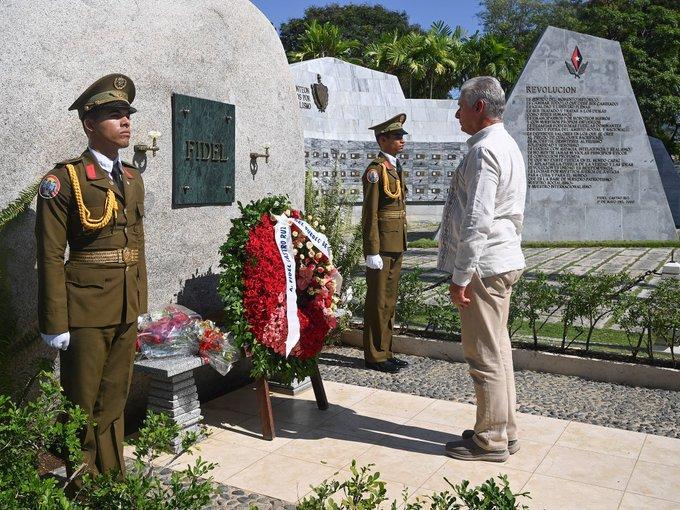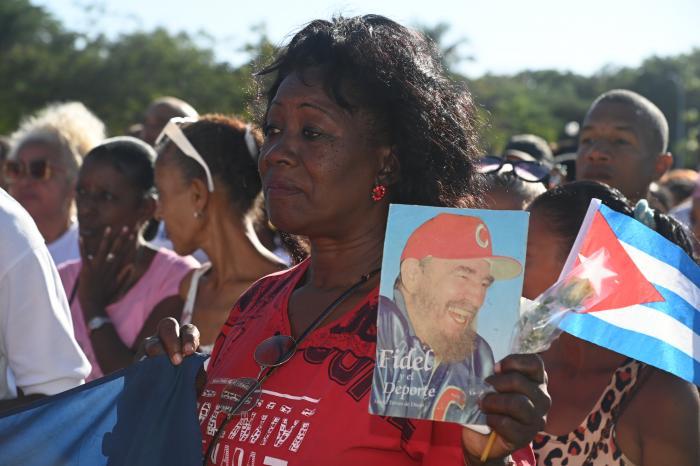
Santa Ifigenia, Santiago de Cuba.–“Fidel is eternal.” Early on August 13, we read that moving, emphatic phrase in a text entitled “And we shall overcome!” The lines belong to First Secretary of the Party's Central Committee Miguel Díaz-Canel Bermúdez.
“Fidel is eternal, not by his own decision or that of those of us who try to follow in his footsteps and continue his immense work of social justice. He achieved this status by interpreting, synthesizing, and making his own the magnificent accumulation of Cuban, Latin American, Caribbean, and universal independence, anti-colonial, anti-imperialist, and Marxist ideas that preceded him, until he placed himself at the forefront for all time.”
Eternity, as always happens in every encounter with the homeland, weighed heavily on everyone at mid-morning on Wednesday, August 13, at Santa Ifigenia Heritage Cemetery, where Díaz-Canel—accompanied by Roberto Morales Ojeda, Member of the Political Bureau and Secretary of Organization of the Party's Central Committee, as well as the highest authorities of the heroic province of Santiago de Cuba—paid tribute to Fidel.
In front of the stone that embodies the eternity of an exemplary life dedicated to millions of human beings, the President placed a bouquet of red roses, white butterflies, and “birds of paradise.”
There, an offering was placed with a ribbon that read: “To Fidel Castro Ruz from the people of Cuba.” And there, the people of Santiago paraded by, from children to the elderly, some of whom shouted phrases into the air or shed tears of gratitude and nostalgia.
Under a clear blue sky without clouds, the head of state also paid tribute in Santa Ifigenia to José Martí, Carlos Manuel de Céspedes, and Mariana Grajales. It was very difficult to rationalize eternity, but there it was with its incorporeal and sacred weight.
At one point in the morning, at the end of the tribute, the press team of the Presidency of the Republic asked Díaz-Canel for some thoughts on the phrase “Fidel is eternal” and on the fact that in the aforementioned article he had highlighted the Commander-in-Chief's ability to overcome all adversity.
“Today is one of those days when feelings are stirred up,” replied the president, referring to “all revolutionary feelings, feelings that also have to do with convictions, and above all with the responsibility to defend those convictions.”
Díaz-Canel told reporters: "Today is a day when one necessarily turns to Fidel. And I believe that Fidel left behind an enormous legacy. Many people have brilliantly described it from their own perspectives. I don't think I can surpass any of those perfect descriptions written by people who were very close to him. But I believe that now, with our proposal to commemorate the centenary of Fidel's birth, the best way to defend that legacy is to find its essence, to appropriate that essence, and to bring Fidel into the present moment.
“That would be the greatest meaning of the life of a Cuban revolutionary in these times: how we find answers, from Fidel's legacy, to solve today's problems.”
There are many elements of inspiration, the dignitary reflected, and he shared his reasons: “Fidel never gave up; Fidel was always thinking about victory; Fidel anticipated victory; Fidel had a conviction of optimism, of the ability to overcome the most difficult challenges.”
The Cuban president highlighted Fidel's merit in having moved from “conviction to the ability to win.” And he defined: "That is very well expressed in a slogan that he shared and that has become, more than a slogan, our meaning of life: Homeland or death: We shall overcome!
“For the homeland, one can give everything, even one's life, but always because we are going to win by defending the homeland.” At that point in his remarks, the dignitary recalled an idea he had recently shared in one of his speeches: "Fidel, with his Centennial Generation, entered history with the assault on the Moncada Barracks. And let's say that, from a military point of view, it can be seen as a setback; but Fidel turned that setback into victory; that is, he entered history with the Centennial Generation, turning a setback into victory."
Díaz-Canel emphasized that “there lies an important part of the roots of that conviction that has made us invincible, which is our resistance. And as we have said on other occasions, our resistance is emotional, it is a resistance of commitment, it is a resistance of conviction, and it is also a creative resistance.”
Regarding Cuba today, the first secretary of the Central Committee of the Party said: "I know that the situation we are experiencing is very complex. Every day we feel the harshness of these times. We are aware of all the shortages we have, of all the difficulties we are facing, of the inconvenience of the blackouts, of the economy that is semi-paralyzed due to fuel shortages and financing deficits; but the fact is that all moments of the Revolution have been difficult, because in all moments of the Revolution we have faced imperial aggression.
“But the Revolution, in all difficult moments, has prevailed. Therefore, bringing Fidel to this time is also believing and being sure that we, too, will overcome this situation, and that we will prevail; that there are no setbacks—there is a complex situation, but there are no setbacks. The setback would be if the Revolution were lost, and here we are.”
The president reflected that "we have endured the first, very aggressive years of a Trump administration; we have endured the years of continuity of that aggressive policy with a Biden administration and with a pandemic, with a renewed blockade; and now we are facing a second Trump administration, surrounded by a clique of people with a visceral hatred of Cuba, of the Revolution.
“We are also in the midst of a complex situation from an economic and social point of view, as we have described; but we have the conviction—when I speak of conviction, I speak of certainty, and it is in that legacy—that we will prevail.”
That attitude, said Díaz-Canel, "is to bring Fidel into these times. How do we do that? How do we achieve it? How do we honor that legacy by turning it into results in difficult times? That emancipates us. Defending that legacy emancipates us. I believe those are the feelings that one could express today in a shorter, more concise way, and above all, assuming the responsibility we have to save the homeland, to save the Revolution, to save the socialist construction in the midst of adversity."
Under an intense sun, the same sun that so often illuminated the will of our mambí fighters, the Cuban president affirmed: “There are no setbacks. There will be victory.”
















